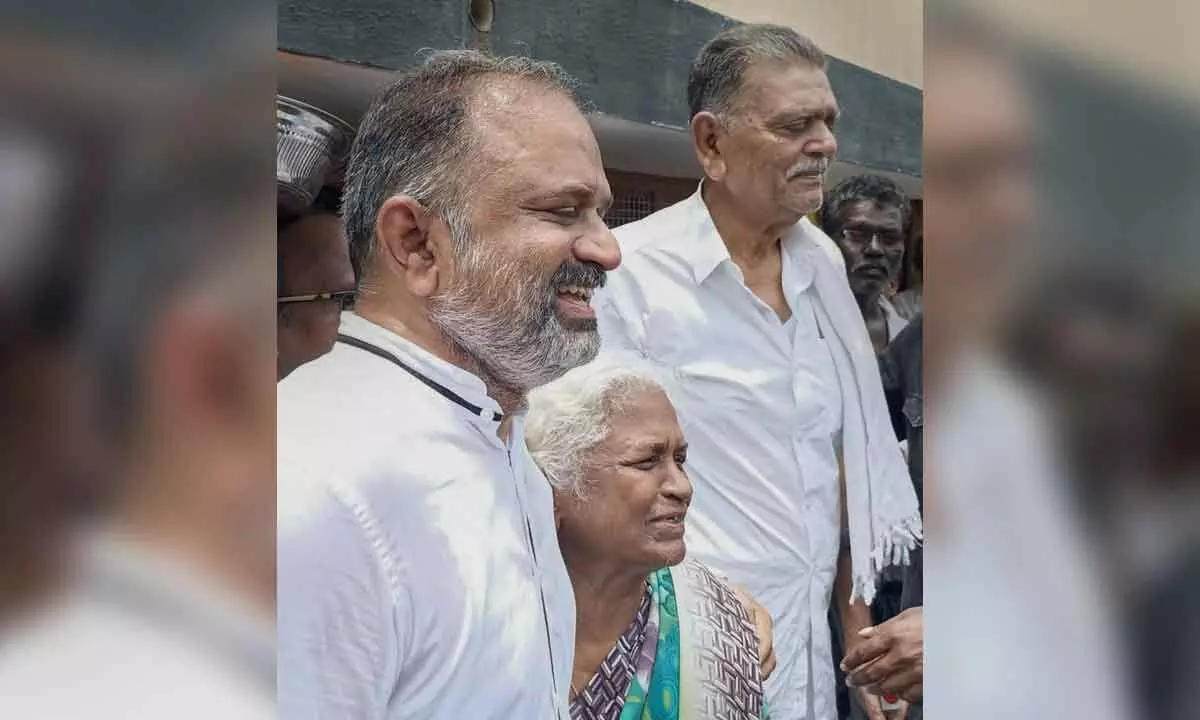Live
- First Star Outside Milky Way Captured: WOH G64 is 2,000 Times Larger Than the Sun
- Sikkim govt to constitute state Niti Ayog: CM Tamang
- CBI books Rajasthan narcotics inspector for Rs 3 lakh bribe
- Rajasthan bypolls: A tough contest between BJP and Congress
- Albania joins SEPA, paving way for EU integration
- Japanese government approves 250-billion USD economic package to ease price pain
- Six pharma companies to set up their units in Telangana
- The Unstable Events of a 17-Wicket Day in Perth: India vs Australia
- Dutch FM's Israel trip cancelled after Netanyahu's arrest warrant
- UK to increase energy price cap by 1.2 per cent
Just In
Supreme Court orders release of convict Perarivalan


AG Perarivalan, convict in Rajiv Gandhi assassination case, with his mother Arputham Ammal after Supreme Court released him using special powers, at his house in Jolarpet, Tirupattur district on Wednesday
Invokes extraordinary power under Article 142 of Constitution
New Delhi: Invoking its extraordinary power under Article 142 of the Constitution, the Supreme Court on Wednesday ordered the release of A G Perarivalan, who has served over 30 years in jail in the Rajiv Gandhi assassination case, and said the Tamil Nadu Governor ought not to have sent the "binding" advice made by the State Cabinet for his release to the President.
While ordering that Perarivalan is "set at liberty forthwith," the apex court also said the reference to Tamil Nadu Cabinet's recommendation to the President after two and a half years was without any constitutional backing and the "inexplicable" delay in deciding remission is "inexcusable" as it contributes to adverse physical conditions and mental distress to the inmates.
A three-judge bench headed by Justice L Nageswara Rao said the Tamil Nadu state Cabinet's advice is binding on the Governor in the exercise of his powers under Article 161 of the Constitution. "The advice of the State Cabinet is binding on the Governor in matters relating to commutation/remission of sentences under Article 161."
"No provision under the Constitution has been pointed out to us nor any satisfactory response tendered as to the source of the Governor's power to refer a recommendation made by the State Cabinet to the President of India," the bench also comprising Justices B R Gavai and A S Bopanna said.
Observing that the Tamil Nadu Governor ought not to have sent the recommendation made by the state Cabinet to the President, the apex court said such action is contrary to the constitutional scheme elaborated above. The apex court also discarded the Centre's argument that the President exclusively has the power to grant pardon in a case under section 302 of the Indian Penal Code, saying this would render article 161 (power of the Governor to grant pardon) functionless.
The top court noted that Perarivalan was 19 years of age at the time of his arrest and has been incarcerated for 32 years, out of which he has spent 16 years on death row and 29 years in solitary confinement. "There has been no complaint relating to his conduct in jail," the court said.
The apex court said that in the absence of any other disqualification and the exceptional facts and circumstances of this case, in the exercise of our power under Article 142 of the Constitution, "the appellant is deemed to have served the sentence in connection with the crime. The Appellant, who is on bail, is set at liberty forthwith."

© 2024 Hyderabad Media House Limited/The Hans India. All rights reserved. Powered by hocalwire.com






